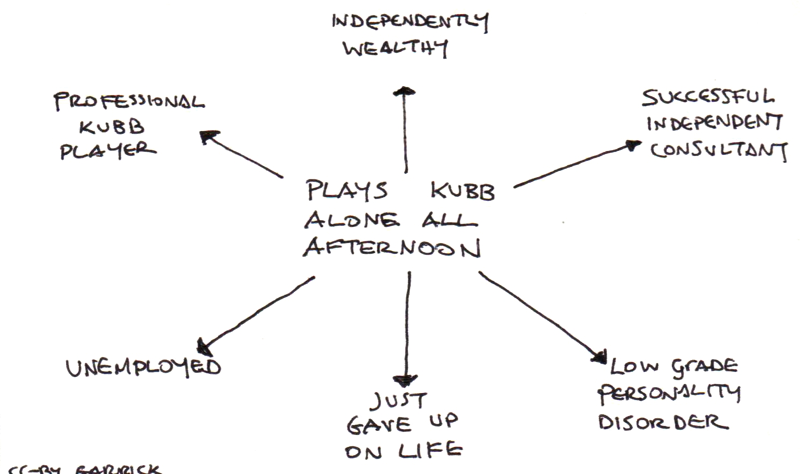For almost 2 years, Jamie and I have been working on a 1-page form to easily and quickly document a kubb game while it’s in progress. The latest version (iteration 10) incorporates a stats section to quickly calculate team performance (without an electronic device). This latest iteration also solves the awkwardness knowing which team opens …
Category Archives: Kubb
What Do the Neighbors Think?
Kubbchuck’s 2013 Loppet Tournament Recap
Over on the Kubbchucks blog I wrote up our 2013 Loppet tournament experience. Here’s a quick snippet: “Jim and Jamie readily cleaned up the 5 kubbs in the corner leaving the that lone sixth kubb for me and two batons. I took a deep breath, focused on the sixth kubb and threw – striking the …
How Kubb Saved My Life
In the summer of 2011, my third child had just turned a year old. I was just beginning to feel reconnected with the world and something approximating normal. My business was having one of its best years, in no small part to my part-time assistant. Yet, despite the optimistic signs all around me – I …
“I have already been to that site”
@ 1:36:00 Such a fun interview. Eric – thanks for helping spread PlanetKubb.com to the other side of the planet.
6 Players are Too Few, 10 is Better
Coming out of my third kubb tournament of 2012 and my first 6-player tournament, I’m even more convinced a 6-player kubb team is an awkward number. This year at U.S. Nationals this year Jamie, Jim and I played under the Kubbchucks banner. I was the primary inkastare – for something like 9 hours non-stop. After …
Buy the Planet Kubb ‘Unite People – Create Peace’ T-Shirt $15
Planet Kubb’s first t-shirt is now available. $15 + $5 shipping. Mens – Medium Mens – Large Mens – XXL If you’d like a different size – email me Just like the graphic above, the shirt will be red with kubb’s slogan – “Unite People and Create Peace” – in calm white letters.
“Nearly all the text is rubbish, but no-one now knows which parts are true.”
“This ‘Kubb’ entry was rescued from Wikipedia on 25th September 2006, in its most extreme and most untrue state. The article was subject to a sustained assault over a five-month period by contributors who were reacting against the censorious approach of one Wikipedia official. Gradually they changed the text, added fictitious names and events, and …
Continue reading ““Nearly all the text is rubbish, but no-one now knows which parts are true.””
That’s a lot of Wood 2012
Dobbie from Des Moines Kubb was in town tonight for the Minnesota Kubb Tuesday night friendlies. Jamie and I played a couple of very fun games with him while testing out the latest Planet Kubb Scoresheet. All told, 14 players were honing their wood tossing skills this evening. Despite the flesh wound, we all fared …
Knocking Wood 2012
The U.S. National Kubb Championship is this weekend. 260 people making that satisfying thwunk, thwunk sound together. Peace on earth. Can’t wait.

